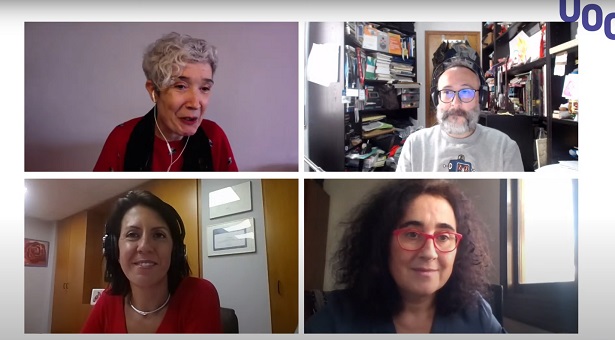On 9 November, coinciding with the Invertors’ Day in honour of Hedy Lamarr, the UOC Faculty of Computer Science, Multimedia and Telecommunications organized a webinar to tackle the current changes and opportunities for gender equity in digital society, in the context of the Covid pandemic. The event was held online as an adaptation of the Equit@t awards ceremony, an initiative by the UOC Faculty of Computer Science, Multimedia and Telecommunications that since 2016 aims at promoting gender equality in ICT fields.
The Equit@t 2020 webinar was chaired by UOC professor María Antonia Huertas and included the participation of GenTIC director Milagros Sáinz as a guest speaker, together with Susana Prado, director of Inetum in Catalonia, and Jordi Vallverdú, professor of Philosophy of Science at Universitat Autònoma de Barcelona.
During the event, the speakers analysed the root causes and the consequences of the lack of women in ICT fields. Milagros Sáinz pointed at gender roles and stereotypes as an important part of the problem, which explain why women have historically been considered to be less skilled at technological and mathematical subjects. As Sáinz explained, longitudinal studies have revealed that many female students gain higher grades in mathematics than their fellow male students, but girls tend to be less self-confident in their math abilities than boys.
Susana Prado emphasized that very few young women consider pursuing a career in technology nowadays. “In a sector that is growing five times more quickly than any other, we can’t allow women not to be present”, she affirmed. UAB professor Jordi Vallverdú highlighted that the lack of women’s perspective can affect the development of future technologies and referred to the worrying gender biases that are present in algorithms and artificial intelligence. According to Milagros Sáinz: “we will not be able to provide solutions to societal challenges if we do not integrate knowledge from different disciplines. Integrating ethical issues and a gender perspective in the design and production of technology is essential to leave no one behind”.
To end, the speakers reflected on how the pandemic has accentuated gender inequalities and commented on the opportunities that might emerge for the technology sector as well as for education and ICT policies to help to foster a more egalitarian society.
Watch the full round table in this video:
